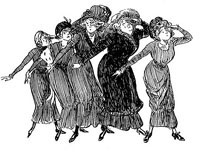
The Decadence of the Feminese Dialect
GUEST COLUMN
Some years ago radical feminists mounted an assault on the English language in the name of “inclusivity.” In particular, they campaigned against the use of historically masculine morphemes — he and his, for instance — as generic forms applicable to both sexes. They also objected to the word man in the sense of “humanity,” and to similar immemorial English usages.
No one who knew anything about the matter —including the feminists — disputed that he, his, and man have in fact referred to both sexes for as long as the English language has been recorded. A look at any historical dictionary (the Oxford English Dictionary or the Middle English Dictionary, for example) establishes this irrefutably. No one has ever been “excluded” by this usage. But in their quest for what they considered political and social advancement — e.g., working in a corporate office rather than at home, being a politician rather than a mother — feminists clutched at any grievance they could find, including the bizarre and false assertion that our generic pronouns and word-forming elements exclude females.
Feminists promoted this notion even though they couldn’t help but know it to be false. I remember talking about it with a woman whose intelligence I had always admired. “The sentence ‘Does everyone have his pencil?’ certainly doesn’t exclude girls,” I said. She concurred, “No, it doesn’t. But why should the generic pronoun be masculine?”
The answer lies in our language’s own (Greek idios) features, which produce a language’s distinctive idiom. We use he and man generically because that has been the practice in English since the eighth or ninth century. That is the English idiom, organically developed and time-tested. Languages are not made to order or amenable to latter-day quotas by gender. Nor are they forgiving of those who twist them out of shape.
You May Also Enjoy
How long can an ideology last when it is based on the demonization of entire sections of the population and on making oneself miserable in the process?
Take orthodoxy away and eventually you end up as some kind of Protestant or secularist, with beliefs no one can predict.
"Clock boy" Ahmed Mohamed may have a promising career ahead of him, not as an engineer or an inventor but as a social agitator and propagandist.

